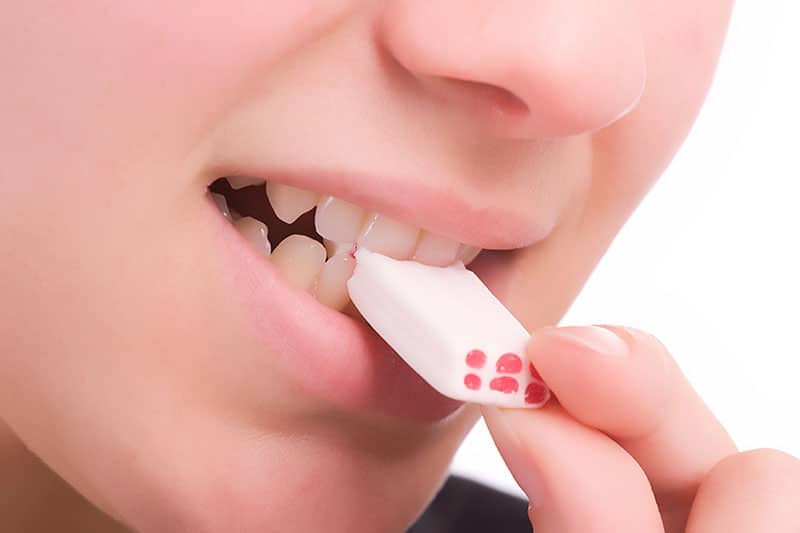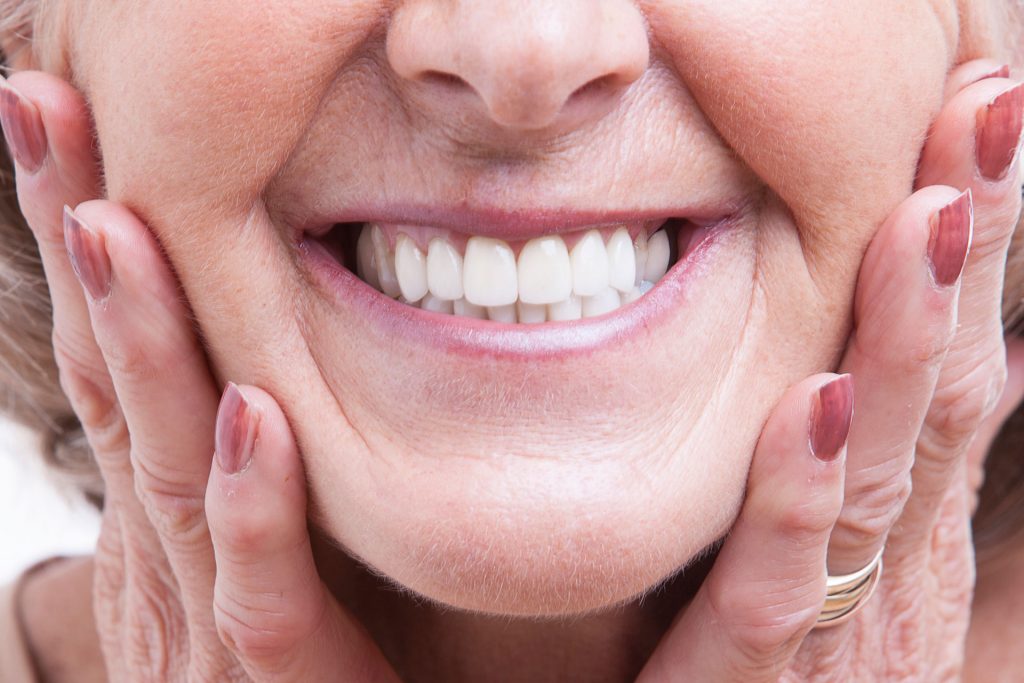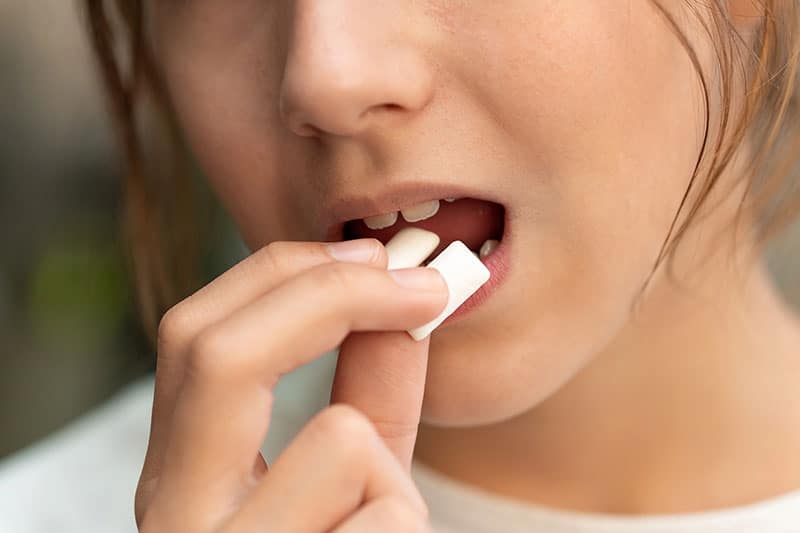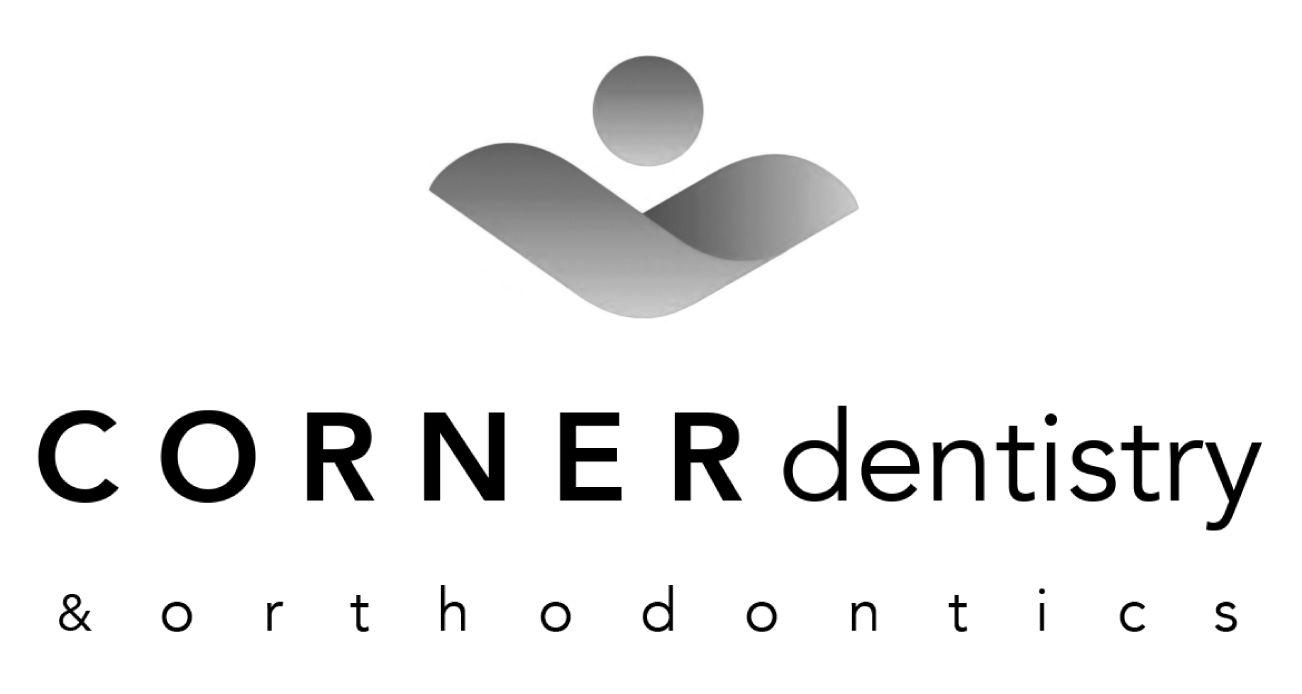Chewing gum is an enjoyable habit that has been around for centuries, but not all gum is created equal. Walking down the gum aisle can be daunting with the number of options, flavors, and brands to consider, and which one you choose will bring different results.
While some chewing gum comes with oral health benefits, others can be detrimental to your teeth and lead to decay. In this article, we will explore common questions about chewing gum and offer advice on the best types of gum to buy.
What Chewing Gum Does To Your Teeth
Chewing gum stimulates saliva production and increases the volume of saliva through both the physical act of chewing and the activation of taste receptors in the mouth. When this happens, teeth can be remineralized, strengthening your teeth’s natural enamel.
The American Dental Association cites that, “The average unstimulated salivary flow rate for healthy people is 0.3-0.4 mL/min. The physical act of chewing stimulates salivary flow: simply chewing unsweetened, unflavored chewing gum base stimulates the salivary flow rate by 10-12 times that of the unstimulated rate.”
What most people don’t understand is that the type of chewing gum you choose can help or hinder your dental health. The sugar content in the chewing gum you choose is the villain in this story; mainstream sugary gums cause tooth decay because the high sugar content eats away at healthy bacteria and breaks down the integrity of your teeth.

Xylitol vs Sorbitol: Which is Better for Your Teeth?
Chewing gum that contains sugar contributes to tooth decay because you are essentially bathing your teeth in artificial sugar. Most sugary chewing gum is made with monosaccharides or disaccharides, which can be derived from glucose, lactose, sucrose, maltose, etc. This type of environment is a playground for cavity-causing bacteria.
Sugar-free chewing gum, which usually is made with xylitol or sorbitol instead of sugar, is noncariogenic and actually creates a positive environment in your mouth to improve oral health. That’s why only sugar-free chewing gums are considered for the ADA Seal of Acceptance.
Xylitol and sorbitol are similar because they are both sugar alcohols, but xylitol stands out when considering ingredients for sugar-free gum. Xylitol not only doesn’t contribute to cavity-causing bacteria, but it also actively inhibits their growth.
While sorbitol is still better than real sugar, it does not have the same dental health benefits as xylitol. Sorbitol can be fermented over time by oral bacteria, leading to slower decay of the teeth. When choosing which sugar-free gum to purchase, xylitol is your best bet if it’s available, but sorbitol is another good alternative to sugary gum.
Types of Gum Beyond Sugar-Free vs. Sugary
Most people only think of gum as “sugar-free” or “sugary”, but the options and their impact on oral health are much broader.
- Whitening gum: These gums often contain mild abrasives or ingredients that help reduce surface stains. They won’t replace whitening treatments, but they can keep teeth looking brighter between brushings.
- Functional gum: Some gums include added ingredients like caffeine, vitamins, or CBD. While the gum may deliver those effects, its impact on oral health depends on the base sweeteners.
- Dental-specific gum: Certain gums are formulated and approved by the ADA to reduce plaque and protect enamel. These are usually xylitol-based.
- Nicotine gum: Used for smoking cessation, this gum is effective for quitting tobacco but may increase dry mouth. Good oral hygiene habits are especially important if using this gum.

Can Chewing Gum Help Prevent Cavities?
Before you reach for some chewing gum, remember that it needs to be sugar-free and ideally sweetened with xylitol. Chewing gum can help prevent cavities because when you chew, your mouth produces more saliva, which acts as a natural rinse cycle – washing away food particles, neutralizing acids, and helping to remineralize your enamel.
Xylitol goes a step further by making life harder for cavity-causing bacteria, essentially cutting off their food supply and introducing healthy bacteria. While chewing gum is no substitute for brushing and flossing, popping a piece after meals, especially when you can’t get to a toothbrush, can give your smile an extra layer of defense.
Downsides of Chewing Gum
While gum can benefit your oral health, there are also potential drawbacks.
- Jaw issues: Excessive chewing can strain your jaw and worsen TMJ disorders.
- Dental work risks: Sticky gum can loosen fillings, crowns, or braces.
- Digestive concerns: Artificial sweeteners like sorbitol can cause bloating or stomach upset in some people.
- Headaches: Chewing gum has been linked to tension headaches or migraines in some people.
Moderation is key with chewing gum. One or two pieces of sugar-free gum a few times per day is typically safe and beneficial.
Should You Chew Gum with Dentures?
People who wear dentures commonly question if they can safely chew gum or not. The answer really depends on the type of gum and how comfortable you are with your dentures. In general, chewing gum is sticky and can cling to the surface of dentures, loosen the adhesive, and even cause them to shift. For a safer option, there are sugar-free gums made specifically for denture wearers. These tend to be less sticky, and they can actually help stimulate saliva flow, which keeps your mouth feeling fresh and reduces dryness – a common issue for denture users.

What to Look for on Gum Packages
When you’re standing in the gum aisle looking for oral-friendly gum, the packaging can be confusing. Here are a few tips to help you choose the best gum for your teeth.
- Check for the ADA Seal of Acceptance: If a gum has the American Dental Association’s seal, it’s been tested and proven to be safe and effective for oral health.
- Look for “sugar-free”: As discussed above, always choose gum labeled sugar-free. If sugar, like glucose, sucrose, or corn syrup, is on the ingredient list, skip it.
- Check the sweetener: Xylitol should be one of the first ingredients for the most dental benefit. Sorbitol and mannitol are good alternatives if xylitol isn’t available.
- Avoid gum with too many additives: Some gums contain extra acids, colorings, or artificial flavorings that may not support oral health. Look for simpler ingredient lists.
- Consider your dental needs: If you wear dentures, braces, or have TMJ issues, look for gums labeled “orthodontic-friendly” or “denture-safe.”
A general rule of thumb is the simpler the ingredient list and the more prominently xylitol is featured, the better the gum is for your teeth.
FAQs About Chewing Gum and Oral Health
Q: Can chewing gum replace brushing and flossing?
A: No. Chewing gum can support oral health but never replaces brushing twice a day and flossing daily.
Q: How long should I chew gum for benefits?
A: About 15-20 minutes after meals is optimal for stimulating saliva flow.
Q: Is chewing gum safe for kids?
A: Yes, in moderation, but avoid gum with sugar. Parents should supervise their kids to prevent choking.
Q: Is chewing gum bad for braces?
A: Regular gum can stick to brackets and wires, but some orthodontists allow sugar-free gum in moderation because it increases saliva and reduces plaque.
Q: Does chewing gum whiten teeth?
A: Whitening gum can help remove some surface stains and prevent new ones from sticking, but it won’t change the natural color of your teeth. Professional whitening is still the most effective option.

Is Gum Bad For Your Teeth? What Dentists Recommend
Chewing gum can be a surprisingly powerful tool for your oral health, if you choose wisely. Sugar-free gum helps fight cavities, freshen breath, and keep your mouth healthy. Don’t forget that chewing gum is not a substitute for a normal dental hygiene routine of brushing and flossing.
If you’re unsure which type of gum is best for your smile or have specific dental needs like dentures, braces, or crowns, ask your dentist for personalized recommendations. At Corner Dentistry, we’re here to help you make smart choices for your oral health. Contact us today to schedule your next checkup, and let’s keep your smile strong, healthy, and cavity-free.
